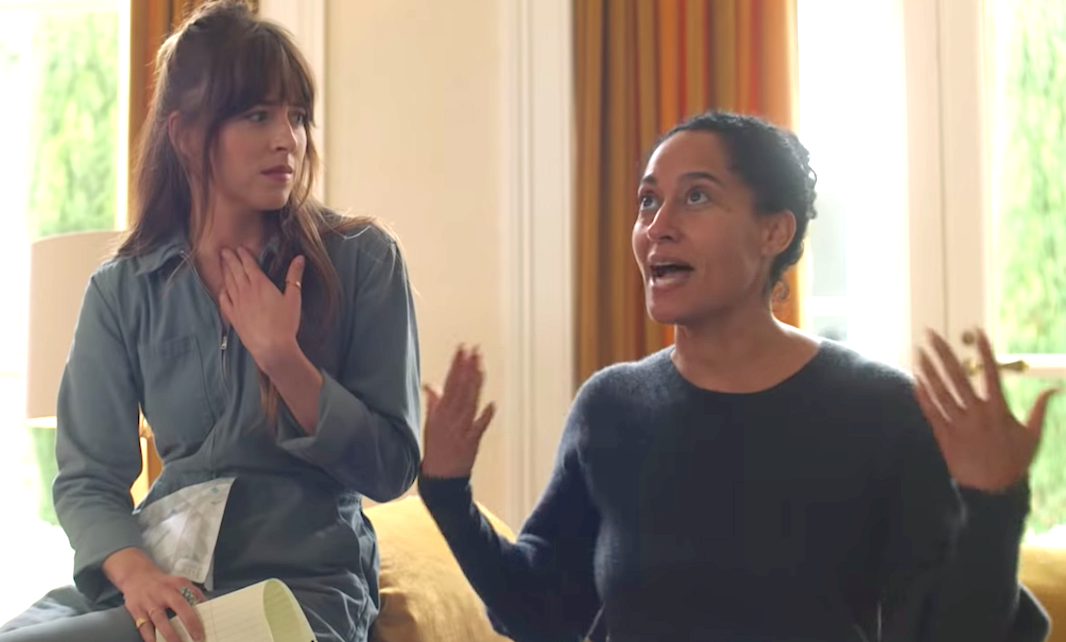
Clawing one’s way toward a dream will involve overcoming many obstacles along the way. These impediments may be further complicated by some of the challenges often thrown at people due to their sex, race, gender, socioeconomic status, or other characteristics. But achieving one’s dream requires a persistence that must always be attended to in order to get to where we want to go. he High Note transports us to the bicoastal music industry as we follow Grace Davis (Tracee Ellis Ross), a legendary but again superstar singer and her personal assistant Maggie Sherwoode (Dakota Johnson) who dreams of becoming a music producer while tending to Grace’s errands. After a fateful meeting with aspiring artist David Cliff Jr. (Kelvin Harrison Jr.), Maggie strives closer to her dream, but it may come with a cost.
The High Note is a story that revolves around music industry heavyweights, both real and fictional, and the film’s soundtrack and score both rise to meet this lofty standard. The original songs featured in the film are at once nostalgically soulful and current, with actors Harrison Jr. and Ross displaying some impressive pipes in their vocal performances. The soundtrack, produced by the legendary Rodney “Darkchild” Jerkins, is a collection of some of the best vocalists and songs in the history of popular music from Aretha Franklin to Donny Hathaway to Maxine Brown. Music lovers are sure to have their eardrums soothed and stimulated, with the tunes in the film reminding the audience of the power of song.
The effective use of music in the film compliments its theme perfectly as the stories of Grace, Maggie, and David all emphasize and explore the importance of dreams; both holding onto those we’ve always had and continually striving for the ones we have yet to reach. Grace and Maggie find each other like two ships passing in the night, with Grace at one crossroads trying to come to grips with her popular musician mortality as an aging black female performer with Maggie at another, trying to make headway as a young female personal assistant dreaming of become the rare female music producer. Both label executives and members of her own team constantly remind Grace of her age, race, and the few female performers with either of these characteristics that can remain popular. Maggie has to overcome her inexperience and the unwillingness of anyone around her to give her a chance at achieving her music-making dreams. Grace’s pained uncertainty over her future and Maggie’s tunnel vision pursuit of hers both serve as cautionary tales for dreamers when it comes to giving up on your aspirations; the former about always remembering one’s hopes and desires no matter the circumstances and who may be discouraging you and the latter about continuing to push through those initial stumbles that inevitably arise when going after what you want. Believing in oneself amid all the noise and discouragement is just as much of a necessity as raw talent.
We spend most of our time with Dakota Johnson, Kelvin Harrison Jr., and Tracee Ellis Ross and the trio offer entertaining performances powered by their believable chemistry. Johnson and Ross are believable in their star-assistant relationship with a bit of a big sister-little sister tinge underneath a employer-subordinate dynamic. Both actress convincingly hit the emotional beats written for their characters and their struggles within the music industry. Kelvin Harrison Jr. continues his steady rise as an actor displaying both his charm and his musical abilities as a singer, building upon his featured role in Epix’s Godfather of Harlem television series. If given the opportunity, Harrison Jr. will become a movie star this decade.
The High Note hits familiar story beats regarding characters chasing goals and aspirations and doesn’t dive deeply enough into what could’ve been a more interesting and less conventional topic of navigating the music business as an aging female superstar. The film does feature a plot twist near its end that finely walks the line between well executed and randomly developed. Despite its conventionality, The High Note keeps the viewer engaged due to the performances and chemistry of Dakota Johnson, Kelvin Harrison Jr, and Tracee Ellis Ross. The film also features quality cinematography from director of photography Jason McCormick with the lighting serving as a real standout onscreen. McCormick’s style under the direction of Ganatra allows for the film’s sets to stand out and puts an eye-popping focus on the actors’ faces. His usage of lens flare is a great compliment to the shots we’re treated to, a bold choice considering that many consider the technique oversaturated and cliche, it instead adds color and pop throughout. The multicolored light’s constant presence during musical scenes in particular also calls to mind some visual storytelling, communicating the beauty of music, a constant theme throughout. The High Note doesn’t break any new ground as a drama or comedy, but it’s still a worthwhile watch.
Image: Focus Features

